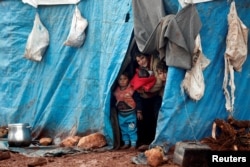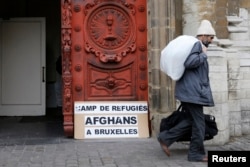International aid groups are warning countries with refugees from the Syrian conflict against forcing them to return to Syria.
Humanitarian groups, including the Norwegian Refugee Council and CARE International, released a report about the refugees this week. It noted the dangers the Syrians will face if they are forcibly returned to a land where fighting continues.
"Hundreds of thousands of refugees are at risk of being pushed to return to Syria in 2018, despite ongoing violence, bombing and shelling that are endangering the lives of civilians," the report said.
"Return would neither be safe nor voluntary for the vast majority who fled the war and the violence," said Jan Egeland, head of the Norwegian Refugee Council. He said that even in areas where fighting has slowed, his group has noted intense violence, “targeting of hospitals and schools, and death.”
Forced from home
The United Nations says at least 300,000 Syrians have fled fighting over the past few weeks in the northwestern province of Idlib. The area has come under heavy attack from Russian and Syrian airplanes.
Officials noted that those Syrians had been displaced from their homes earlier.
Aid agencies estimate that 721,000 Syrian refugees returned to their home country last year. In 2016, the number was 560,000. The report warns that continuing violence is expected to force 1.5 million Syrians from their homes this year.
In countries bordering Syria, including Lebanon, Jordan, and Turkey, talk of returning the refugees has increased.
The report said Syria’s neighbors have been closing borders, expelling some refugees, and forcing others to return involuntarily. It added that more governments are planning such repatriations -- not just of Syrians, but also those who have fled from war in other countries, including Afghanistan and Iraq.
Governments are under the influence of rising populist anger against immigrants and public fear of foreigners. The aid agencies also warned of economic migrants being sent back to their home countries.
Repatriations planned to increase
Israel is planning to remove an estimated 20,000 migrants from Sudan and Eritrea. In Italy, a coalition of political parties is campaigning for more than 100,000 migrants to be sent home over the next 12 months.
Aid agencies remember the year 2015 for a migration crisis, with large numbers of people arriving in Europe. Now, humanitarian workers fear 2018 could become the year of repatriation.
"Return and repatriation of refugees and migrants is high on the European political agenda," the UN children's agency warned.
However in Italy, interior minister Marco Minniti, has led an effort to take the migration issue away from populist politicians. Minniti has become known for making deals with militias along Libya's coast and tribes in its desert to stop human trafficking.
Recently, a deal with Libya's coastguards has seen asylum-seekers stopped at sea and returned to Libya before they ever get to Italy. Humanitarian groups have warned that those being stopped at sea face bad conditions in detention in Libya.
International agreements on refugees
At the United Nations Refugee Convention 1951, countries signed a treaty defining who is a refuge. Since then, European governments have not taken part in mass forced repatriation of war refugees. But now there has been an increase in the return of asylum-seekers from Afghanistan. The Afghans are not considered war refugees by the European Union, or EU.
The convention says that refugees may not be returned if they fear their "life or freedom may be threatened" because of their race, religion, nationality, membership in a social group or opinion. U.N. refugee policies also state that once asylum is approved in another country, refugees can be forced to return home only when conditions in their home country have improved.
In recent weeks, the European Parliament has pressured Britain and other European countries to explain why they have refused requests and sent back hundreds of Afghan asylum-seekers.
In 2016, EU officials reached an aid agreement with Afghanistan. This included the Afghan government’s willingness to take back refused asylum-seekers. However since the agreement, involuntary repatriations have increased quickly.
The International Organization for Migration says 500 Afghans were forcibly removed to Afghanistan in 2017. Human rights activists say people sent home could be killed.
Iraqi officials are also concerned about plans in Europe for the forced return of Iraqi refugees whose asylum requests have been denied.
Last month, the head of the Iraqi parliament's foreign relations committee urged the government to refuse to negotiate with EU countries concerning forced repatriation of Iraqis.
I’m Phil Dierking.
Jaime Dettmer reported this story for VOANews.com. Phil Dierking adapted his report for VOA Learning English. George Grow was the editor.
What do you think the rules should be for how long refugees should be allowed to stay in another country? We want to hear from you. Write to us in the Comments Section or on our Facebook page.
_______________________________________________________________
Words in This Story
agenda - n. a list of things to be considered or done
despite - prep. used to say that something happens or is true even though there is something that might prevent it from happening or being true
migrant - n. a person who goes from one place to another especially to find work
repatriation - n. when someone is returned to his or her own country







